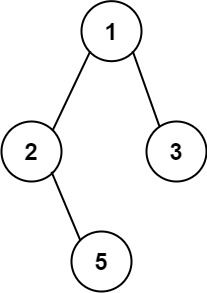Welcome to Subscribe On Youtube
257. Binary Tree Paths
Description
Given the root of a binary tree, return all root-to-leaf paths in any order.
A leaf is a node with no children.
Example 1:

Input: root = [1,2,3,null,5] Output: ["1->2->5","1->3"]
Example 2:
Input: root = [1] Output: ["1"]
Constraints:
- The number of nodes in the tree is in the range
[1, 100]. -100 <= Node.val <= 100
Solutions
-
/** * Definition for a binary tree node. * public class TreeNode { * int val; * TreeNode left; * TreeNode right; * TreeNode() {} * TreeNode(int val) { this.val = val; } * TreeNode(int val, TreeNode left, TreeNode right) { * this.val = val; * this.left = left; * this.right = right; * } * } */ class Solution { private List<String> ans = new ArrayList<>(); private List<String> t = new ArrayList<>(); public List<String> binaryTreePaths(TreeNode root) { dfs(root); return ans; } private void dfs(TreeNode root) { if (root == null) { return; } t.add(root.val + ""); if (root.left == null && root.right == null) { ans.add(String.join("->", t)); } else { dfs(root.left); dfs(root.right); } t.remove(t.size() - 1); } } -
/** * Definition for a binary tree node. * struct TreeNode { * int val; * TreeNode *left; * TreeNode *right; * TreeNode() : val(0), left(nullptr), right(nullptr) {} * TreeNode(int x) : val(x), left(nullptr), right(nullptr) {} * TreeNode(int x, TreeNode *left, TreeNode *right) : val(x), left(left), right(right) {} * }; */ class Solution { public: vector<string> binaryTreePaths(TreeNode* root) { vector<string> ans; vector<string> t; function<void(TreeNode*)> dfs = [&](TreeNode* root) { if (!root) { return; } t.push_back(to_string(root->val)); if (!root->left && !root->right) { ans.push_back(join(t)); } else { dfs(root->left); dfs(root->right); } t.pop_back(); }; dfs(root); return ans; } string join(vector<string>& t, string sep = "->") { string ans; for (int i = 0; i < t.size(); ++i) { if (i > 0) { ans += sep; } ans += t[i]; } return ans; } }; -
# Definition for a binary tree node. # class TreeNode: # def __init__(self, val=0, left=None, right=None): # self.val = val # self.left = left # self.right = right class Solution: def binaryTreePaths(self, root: Optional[TreeNode]) -> List[str]: def dfs(root: Optional[TreeNode]): if root is None: return t.append(str(root.val)) if root.left is None and root.right is None: ans.append("->".join(t)) else: dfs(root.left) dfs(root.right) t.pop() ans = [] t = [] dfs(root) return ans -
/** * Definition for a binary tree node. * type TreeNode struct { * Val int * Left *TreeNode * Right *TreeNode * } */ func binaryTreePaths(root *TreeNode) (ans []string) { t := []string{} var dfs func(*TreeNode) dfs = func(root *TreeNode) { if root == nil { return } t = append(t, strconv.Itoa(root.Val)) if root.Left == nil && root.Right == nil { ans = append(ans, strings.Join(t, "->")) } else { dfs(root.Left) dfs(root.Right) } t = t[:len(t)-1] } dfs(root) return } -
/** * Definition for a binary tree node. * class TreeNode { * val: number * left: TreeNode | null * right: TreeNode | null * constructor(val?: number, left?: TreeNode | null, right?: TreeNode | null) { * this.val = (val===undefined ? 0 : val) * this.left = (left===undefined ? null : left) * this.right = (right===undefined ? null : right) * } * } */ function binaryTreePaths(root: TreeNode | null): string[] { const ans: string[] = []; const t: number[] = []; const dfs = (root: TreeNode | null) => { if (!root) { return; } t.push(root.val); if (!root.left && !root.right) { ans.push(t.join('->')); } else { dfs(root.left); dfs(root.right); } t.pop(); }; dfs(root); return ans; }